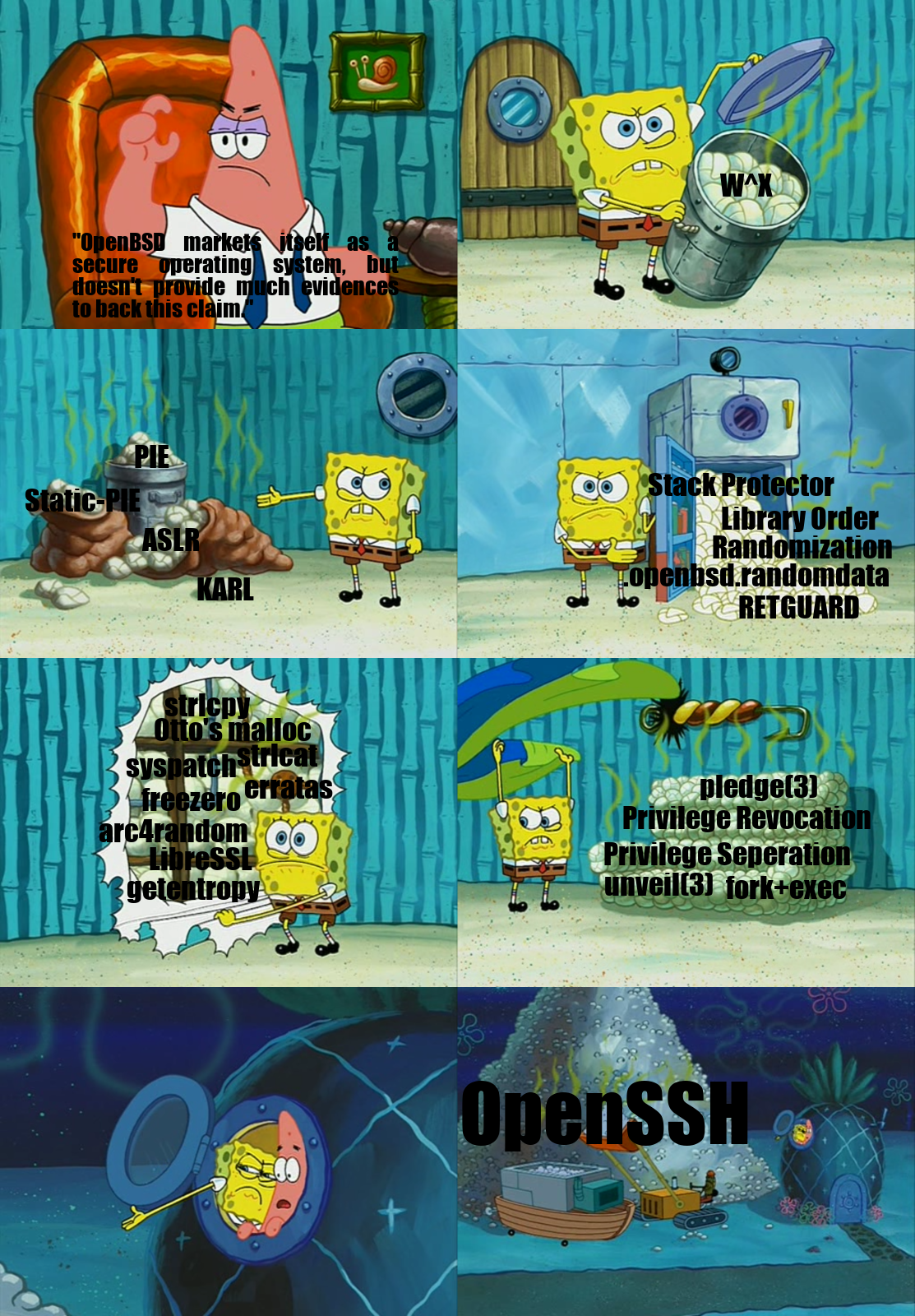About
What is this website about?
OpenBSD’s mitigations.
What is OpenBSD?
In the words of Wikipedia:
OpenBSD is a free and open-source, security-focused, Unix-like operating system based on the Berkeley Software Distribution.
Why was this website created?
Someone was bragging on IRC about how secure OpenBSD is compared to everything else, but this came without concrete evidences.
Tired of having to endure this once too often, time was spent documenting OpenBSD’s security features:
- where are they coming from?
- against what are they defending?
- how successful are they?
Because, in the words of Ryan Mallon:
Threat modelling rule of thumb: if you don’t explain exactly what you are securing against and how you secure against it, the answers can be assumed to be: “bears” and “not very well”.
While the website as a whole might be considered petty, it has been written (mostly) in good faith, and aims at being as thorough as possible, to foster fair conversations on OpenBSD’s security properties and designs. A great example of properly designed and thus effective mitigation is Apple’s Towards the next generation of XNU memory safety: kalloc_type blogpost.
But there are not a lot of public exploits against OpenBSD, so it must be secure!
There isn’t a single one (beside DoS) against TempleOS, Redox, MINIX, Haiku, MenuetOS, … Does it mean that they’re more secure than OpenBSD?
But OpenBSD has a lot of mitigations, so it must be secure!
When the talk was announced, a lot of people reacted by mentioning that OpenBSD has a large amount of mitigations, documented on the innovation web page, with papers on the events and papers one.
Someone even made a fun picture:
Unfortunately, having a lot of mitigations, doesn’t mean that they’re any good.
Only two remote holes in the default install, in a heck of a long time!
Two remote public holes in the default install, as in “unauthenticated remote code execution”. How many local privilege escalation? How many remote/local denial of service? How many remote code execution in software not present in the non-default install? How many private ones that were never disclosed? Other operating systems didn’t have many unauthenticated RCE either…
This metric alone isn’t enough to properly assess the security of an operating system.
Why was this website made public at a conference? Why didn’t you work with the OpenBSD community?
Because the OpenBSD community is notorious for not being nice and welcoming:
- They’re proud of not having a code of conduct, and were mocking FreeBSD for adopting one.
- Theo is known to routinely call people names and being harsh, calling people assholes, inaccurate jerk, stupid, …
More examples here, here, here, here, …
This website was done because studying mitigations is fun, not to get involved in a huge flamewars or endless bike-shedding on mailing lists.
Who’s behind this website?
I’m stein.
A lot of people helped: ts[…], cr[…], st[…], ne[…], sp[…] & pi[…], mv[…], Ob[…], jo[…], ja[…] & ma[…], ss[…], jo[…], …
I’ve found a mistake!
Please do send an email so that it be fixed.
Where can I get the kick-ass “Got hacked” OpenBSD t-shirt that stein was wearing on stage?
On Teepublic.
Why so much negativity and sarcasm on the quotes webpage?
Because I didn’t manage to find positive quotes from security professionals about OpenBSD, but if you know any, I’ll be happy to add them.
What sources were used?
- The exp_moosecox.c exploit, spender, 2009
- The insecurity of OpenBSD, allthatiswrong, 2010
- Notes on abusing exit handlers, bypassing pointer mangling and glibc ptmalloc hooks, Warren Levin, 2017
- Do randomized PIDs bring more security?, stackexchange, 2017
- OpenBSD security features, Wikipedia, 2019
- Documentation for the PaX project, the PaX Team, 2015
- grsecurity and PaX patches, Spender and pipacs.
- Grsecurity and PaX Configuration Options, Wikibooks, 2019
- Maxime Villard’s entertaining twitter account
- Historical security features map of Ubuntu, 2019, Ubuntu security team
- A Comparison of Buffer Overflow Prevention Implementations and Weaknesses, 2004, Peter Silberman and Richard Johnson
- OpenBSD’s source code (especially the github mirror), 2019, OpenBSD developers
- The OpenBSD’s papers/events, 2019, respective authors
- The endless comment threads of Undeadly.org, 2019, respective authors and Anonymous Cowards
- r/openbsd, 2019, respective authors
- Wideopenbsd.org, 2012, hypercube
- Security Fantasies and Realities for the BSDs, AsiaBSDCon 2019 Keynote, by George Neville-Neil, mostly because it is hilariously embarrassing.
- Effective Memory Safety Mitigations, 2018, Chris Rohlf
- Syssec’s Review of the State-of-the-Art in Cyberattacks, 2011, Syssec consortium
- Control-flow integrity, 2022, Maskray
- OpenBSD innovations timeline, 2023, Tom Van Looy
- HardenedBSD’s Easy Feature Comparison
- Archive.org

